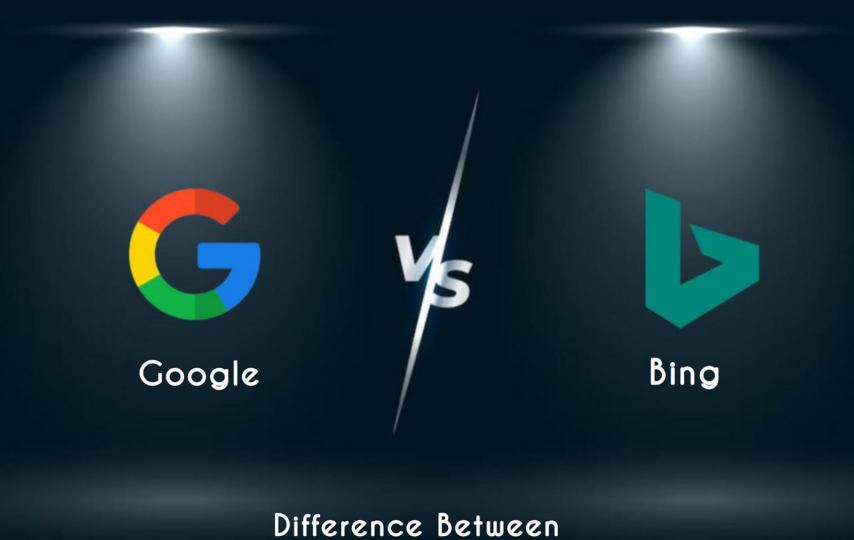In the vast digital landscape, search engines have become an integral part of our daily lives, guiding us through the vast expanse of information available on the internet. Among the numerous search engines available, Google and Bing have established themselves as prominent players, each offering its own unique approach to search. Understanding the divergent strategies employed by these search giants is crucial in determining which one is right for you.
Take a look at Bing and Google’s history
Google’s History
Google, founded in 1998 by Larry Page and Sergey Brin, quickly revolutionized the search engine landscape. Google was founded as a Stanford University research project with the intent of organizing all of the world’s information and making it accessible to everyone. Its breakthrough came with the development of the PageRank algorithm, which ranked search results based on the relevance and authority of web pages.
Google’s efficient search algorithms and superior results quickly propelled it to the forefront of the search engine market. As Google grew, it expanded its services beyond search, introducing popular products like Gmail, Google Maps, Google Drive, and YouTube. Google’s commitment to innovation and user experience led to the introduction of various search features, including Google Instant (real-time search suggestions), Knowledge Graph (displaying information directly in search results), and voice search capabilities.
Bing’s History
Bing is a search engine developed by Microsoft, introduced in 2009 as a competitor to Google’s search dominance. It marked a shift in Microsoft’s search strategy, aiming to provide a visually appealing and interactive search experience. Bing’s launch followed earlier attempts by Microsoft with search engines like MSN Search and Windows Live Search, which struggled to gain significant market share.
With Bing, Microsoft focused on delivering a visually rich interface, featuring daily changing background visuals that showcased stunning images. Bing also integrated specialized search features, such as image and video search, prominently in its design. Furthermore, Bing emphasized integration with Microsoft’s ecosystem, including Windows, Office, and Cortana, offering a cohesive experience for Microsoft users. It also incorporated social media integration, providing real-time updates and trending topics from platforms like Facebook and Twitter within search results.
Let’s take a closer look at what these two search engines can actually do:
Google: The Pioneer of Search
Google has revolutionized the way we search for information on the internet. Its mission, stated as “to organize the world’s information and make it universally accessible and useful,” has been the driving force behind its success. Google’s approach to search is based on several key principles:
1. Relevance and Ranking
A key component of Google’s search strategy is to deliver the most relevant results to users. As a result of its sophisticated algorithms, search results are ranked based on factors such as keyword relevance, web authority, user engagement, and many other factors. Google’s continuous refinement of its algorithms ensures that users receive accurate and up-to-date information.
2. User Experience
There is great emphasis on providing a seamless and intuitive search experience on Google’s part. A number of factors contribute to its popularity, including its minimalist design, its speedy loading, and its easy-to-use interface. Additionally, Google constantly introduces new search features, such as featured snippets, knowledge panels, and rich results, to enhance the user experience and provide quick access to relevant information.
3. Artificial Intelligence (AI)
Google has made significant investments in AI technology, particularly with the development of its machine learning algorithm known as RankBrain. This AI-powered system helps Google understand the intent behind user queries better and improves search result accuracy over time. Google also uses AI for tasks like language translation, image recognition, and voice search, further enhancing its capabilities.
4. Diverse Search Offerings
Beyond standard web search, Google offers a wide range of specialized search services. Users can access image search, video search, news search, shopping search, and more. Additionally, Google provides additional features like Google Maps, Google Flights, Google Translate, and Google Scholar, making it a comprehensive search platform catering to various user needs.
Microsoft Bing
Bing emerged as a direct competitor to Google. Although Bing has not achieved the same level of market dominance, it has a significant user base and a distinct approach to search:
1. Visual Appeal
Bing differentiates itself by focusing on visually rich search results. It incorporates high-quality images and background visuals that change daily, offering an aesthetically pleasing search experience. The visually appealing approach of Bing is particularly attractive to users who appreciate the integration of striking visuals in their search results.
2. Integration with Microsoft Products
As a product of Microsoft, Bing integrates seamlessly with various Microsoft products, such as Windows, Office, and Cortana. This integration provides a cohesive ecosystem for Microsoft users, allowing for convenient cross-platform search experiences. Users who heavily rely on Microsoft products may find Bing’s integration advantageous.
3. Social Integration
Bing incorporates social media data into its search results, particularly from platforms like Facebook and Twitter. This integration enables users to access real-time social media updates, news, and trending topics directly from the search engine. Individuals who value staying up-to-date with the latest social media trends may find this feature useful.
4. Unique Features
The differences between Google vs bing search engine can be summed up as follows. For instance, it provides a rewards program called Bing Rewards, where users can earn points for using the search engine and redeem them for various rewards. Bing also showcases interactive homepage quizzes, trivia, and background stories, adding an element of entertainment to the search experience.
Which One is Right for You?

Choosing between Google and Bing ultimately depends on your preferences and specific needs. You may want to consider the following factors before making a decision:
1. Search Results Accuracy
If you prioritize highly accurate and relevant search results, There are many reasons why Google is such a good choice, including its advanced algorithms and AI capabilities. Google’s focus on relevance and constant algorithm refinements contribute to its reputation for delivering accurate information.
2. Input From the User
Google’s simple and intuitive interface, coupled with its extensive range of features, offers a seamless user experience. Bing’s visually appealing search results and integration with Microsoft products may be more appealing to those who value aesthetics and integration.
3. Specialized Searches
If you require specialized searches, such as image or video searches, Google’s dedicated services are more comprehensive and refined. However, Bing’s emphasis on visual content and its video-centric approach may be advantageous for specific requirements.
4. Social Media Integration
Bing’s integration with social media platforms like Facebook and Twitter may be beneficial if you heavily rely on real-time updates and trending topics.
5. Microsoft Ecosystem
If you are a frequent user of Microsoft products, Bing’s integration with Windows, Office, and Cortana may enhance your overall productivity and provide a more cohesive experience.
Conclusion,
Both Google and Bing offer unique approaches to search, catering to different user preferences. Google’s emphasis on relevance, user experience, and AI-powered search make it a popular choice for most users. On the other hand, Bing’s visual appeal, social integration, and Microsoft ecosystem integration may be attractive to specific audiences. Consider your priorities and specific needs to determine which search engine aligns best with your requirements and enhances your overall search experience.








